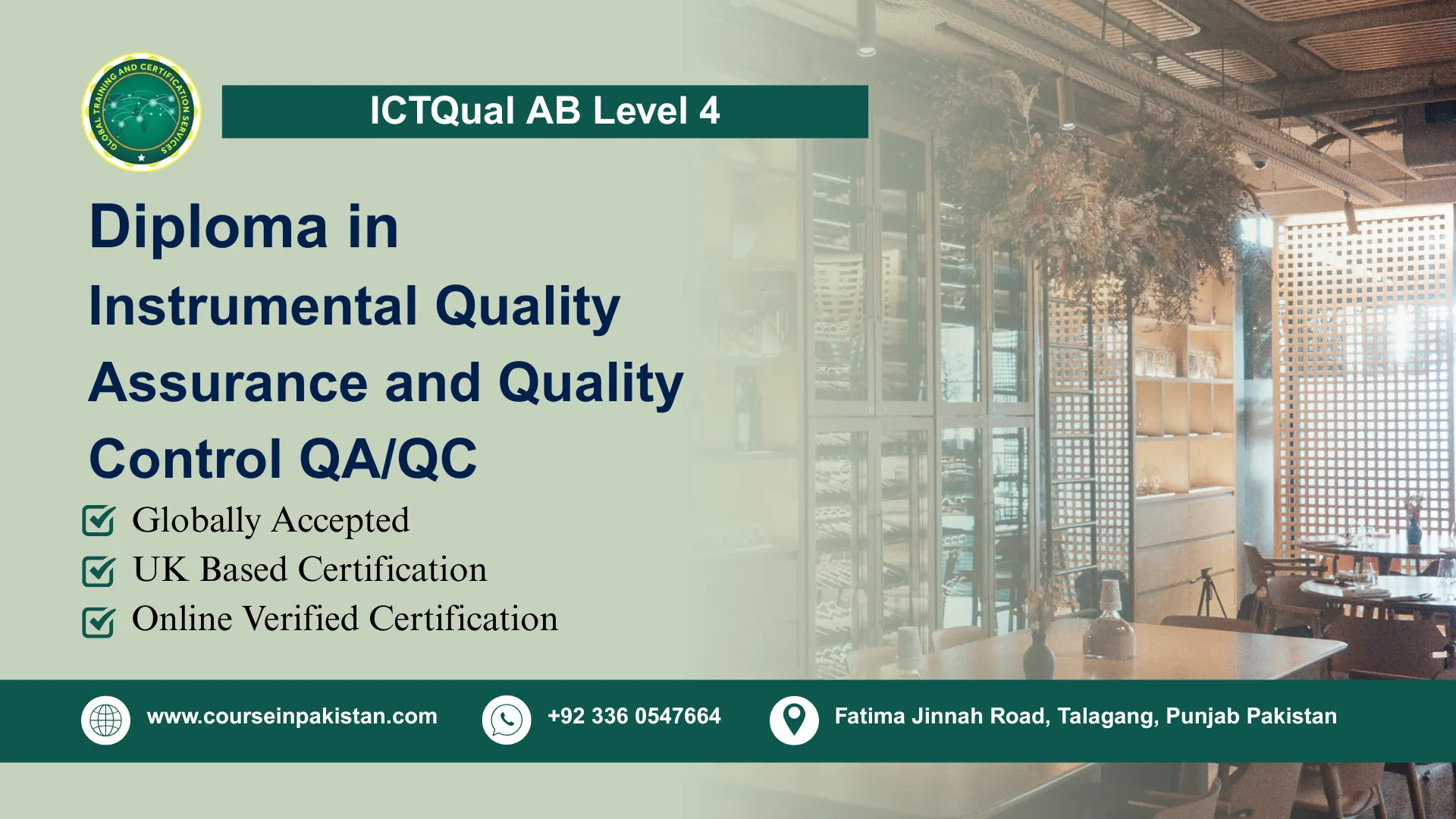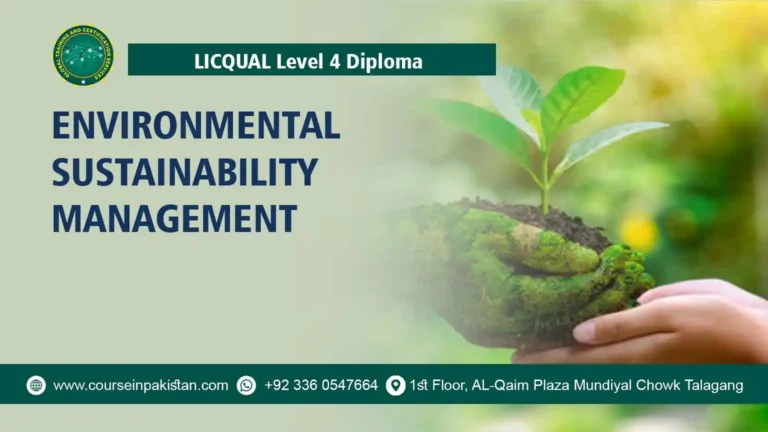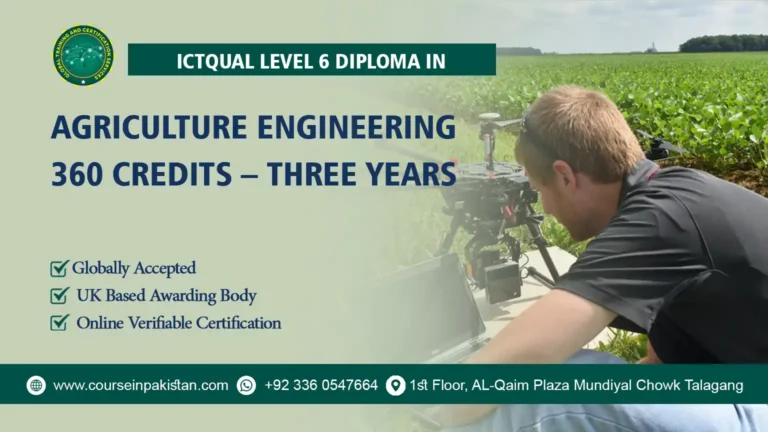
The ICTQual AB Level 4 Diploma in Instrumental Quality Assurance and Quality Control (QA/QC) is an advanced vocational qualification designed to build upon foundational QA/QC skills and prepare learners for more specialized roles in industrial quality management. This program focuses on the integration of instrumentation techniques with quality assurance protocols, ensuring learners can uphold rigorous standards across diverse industrial sectors.
Throughout the course, learners will explore advanced topics such as inspection planning, calibration audits, international compliance frameworks, and instrumentation system validation. The curriculum combines theoretical instruction with hands-on training, allowing students to work with industry-standard equipment and software tools. Learners will also gain experience in interpreting technical documentation, conducting root cause analysis, and implementing corrective and preventive actions.
This diploma is ideal for professionals seeking to advance their careers in manufacturing, oil and gas, pharmaceuticals, food processing, and engineering services. It equips learners with the competencies needed to lead QA/QC teams, manage inspection processes, and contribute to continuous improvement initiatives. Graduates will be well-prepared to take on supervisory roles or pursue further academic and professional certifications in quality assurance and instrumentation.
Course Overview
The ICTQual AB Level 4 Diploma in Instrumental QA/QC offers a comprehensive and practical approach to quality assurance in industrial instrumentation. Learners will study modules covering quality management systems, advanced calibration techniques, inspection protocols, international standards (ISO, ASTM, API), and documentation control. The course emphasizes the importance of precision, traceability, and compliance in maintaining product and process integrity.
Students will engage in real-world simulations and case studies that reflect current industry challenges. They will learn to perform detailed inspections, analyze quality data, and manage QA/QC documentation in line with global standards. By the end of the program, graduates will possess the technical and analytical skills required to ensure consistent quality performance and support operational excellence across industrial environments.
Key Highlights of the Course:
- Advanced training in QA/QC principles and instrumentation system validation
- Practical experience with calibration audits, inspection tools, and quality software
- Coverage of international standards including ISO, ASTM, API, and IEC
- Emphasis on documentation control, traceability, and compliance reporting
- Real-world case studies and simulations for hands-on learning
- Preparation for supervisory roles and advanced QA/QC responsibilities
- Globally recognized qualification enhancing career mobility and credibility
Course Benefits
The ICTQual AB Level 4 Diploma in Instrumental QA/QC offers a wide range of benefits for learners aiming to specialize and grow in the field of industrial quality assurance. Below are the key advantages:
Enhanced Technical Expertise
- Master advanced QA/QC techniques and instrumentation practices
- Learn to conduct calibration audits and validate complex systems
- Gain proficiency in using quality software and inspection tools
Career Advancement
- Qualify for roles such as QA/QC Supervisor, Quality Engineer, or Compliance Officer
- Access leadership opportunities in high-demand sectors like oil and gas, manufacturing, and pharmaceuticals
- Build a professional portfolio through project work and industry-relevant case studies
Industry Readiness
- Work confidently in regulated environments with strict quality and safety standards
- Apply international codes and standards to ensure global compliance
- Support continuous improvement and defect prevention initiatives
Professional Recognition
- Earn a respected diploma that validates advanced QA/QC capabilities
- Enhance your credibility and visibility in competitive job markets
- Prepare for certification exams and professional memberships in quality organizations
Whether you’re looking to lead quality teams, manage inspection processes, or pursue further specialization, this diploma provides the advanced skills, industry relevance, and professional recognition needed to thrive in QA/QC roles across global industrial sectors.
Course Study Units
This qualification, the ICTQual AB Level 4 Diploma in Instrumental Quality Assurance and Quality Control QA/QC, consists of 6 mandatory units.
- Developing and Applying ITPs in Instrumentation Projects
- Inspection Checklists and Documentation for Compliance
- Material Receiving, Handling, and Preservation Procedures
- Application of NEC‑250 Grounding and NEMA VE‑1/VE‑2 Cable Tray Standards
- Installation Practices for Conduits (RMS, FMT, RGS, IMT – NEC Articles 344–400)
- Intermediate Loop Checking, Testing, and Commissioning Techniques
Learning Outcomes
The ICTQual AB Level 4 Diploma in Instrumental QA/QC is designed to develop advanced competencies in quality assurance, inspection, and instrumentation practices. Learners will gain the technical knowledge and practical skills required to manage QA/QC documentation, apply international standards, and oversee installation and commissioning procedures in industrial environments. Each unit focuses on critical aspects of quality control and instrumentation, preparing learners for supervisory roles and specialized functions.
Developing and Applying ITPs in Instrumentation Projects
- Understand the structure and purpose of Inspection and Test Plans (ITPs) in instrumentation projects.
- Develop ITPs aligned with project specifications, client requirements, and industry standards.
- Identify inspection points, hold points, and witness points within instrumentation workflows.
- Coordinate with QA/QC teams, contractors, and clients to implement ITPs effectively.
- Monitor and document inspection activities for traceability and compliance.
- Evaluate the effectiveness of ITPs and revise them based on project feedback and outcomes.
Inspection Checklists and Documentation for Compliance
- Create and utilize inspection checklists tailored to instrumentation systems and components.
- Ensure inspection documentation meets regulatory, client, and internal quality standards.
- Record inspection findings accurately and maintain traceable documentation.
- Identify non-conformities and initiate corrective and preventive actions (CAPA).
- Understand the role of documentation in audits, certifications, and regulatory reviews.
- Apply digital tools and software for efficient inspection record management.
Material Receiving, Handling, and Preservation Procedures
- Verify received instrumentation materials against purchase orders and specifications.
- Inspect materials for damage, conformity, and certification before acceptance.
- Apply proper handling techniques to prevent contamination or mechanical damage.
- Implement preservation methods for long-term storage and pre-installation protection.
- Maintain detailed records of material receipt, inspection, and storage conditions.
- Comply with safety and quality protocols during material handling operations.
Application of NEC‑250 Grounding and NEMA VE‑1/VE‑2 Cable Tray Standards
- Understand the grounding requirements outlined in NEC‑250 for instrumentation systems.
- Apply NEMA VE‑1 and VE‑2 standards for cable tray design, installation, and support.
- Inspect grounding systems and cable trays for compliance with electrical codes.
- Ensure proper bonding, continuity, and protection in grounding installations.
- Document grounding and cable tray inspections for quality assurance and safety audits.
- Identify and resolve common issues in grounding and cable tray installations.
Installation Practices for Conduits (RMS, FMT, RGS, IMT – NEC Articles 344–400)
- Understand the specifications and applications of various conduit types used in instrumentation.
- Apply NEC Articles 344–400 to ensure compliant conduit installation practices.
- Inspect conduit routing, support, and sealing for mechanical integrity and safety.
- Coordinate conduit installation with other trades to avoid conflicts and ensure system integration.
- Document installation activities and verify compliance with project drawings and standards.
- Identify installation defects and implement corrective measures during QA/QC inspections.
Intermediate Loop Checking, Testing, and Commissioning Techniques
- Perform loop checking procedures to verify signal continuity and instrument functionality.
- Conduct functional testing of control loops, transmitters, and final control elements.
- Identify and troubleshoot faults during loop testing and commissioning phases.
- Document test results, calibration data, and commissioning reports for QA/QC records.
- Coordinate with engineering and operations teams during system startup and handover.
- Ensure instrumentation systems meet operational, safety, and performance requirements.
By mastering the learning outcomes across these six units, learners will be equipped to lead QA/QC operations, manage inspection documentation, and oversee instrumentation installations with precision and professionalism. This qualification prepares individuals for advanced roles in industrial quality assurance and supports further academic and career progression in the field of instrumentation and compliance.
Who is This Course For?
The ICTQual AB Level 4 Diploma in Instrumental QA/QC is designed for learners who are ready to advance their skills in industrial quality assurance and control. The ideal candidate should demonstrate the following qualities:
- Foundational Knowledge in QA/QC or Instrumentation Has completed a Level 3 qualification or possesses basic experience in quality control or industrial instrumentation.
- Strong Attention to Detail Capable of identifying discrepancies, analyzing data, and maintaining documentation accuracy.
- Analytical and Problem-Solving Skills Able to interpret technical standards, conduct inspections, and implement corrective actions.
- Commitment to Quality and Compliance Values precision, safety, and adherence to international standards and procedures.
- Career-Oriented Mindset Motivated to pursue supervisory roles or specialize in QA/QC functions within industrial sectors.
- Adaptability and Willingness to Learn Open to working with new technologies, software tools, and evolving quality frameworks.
This course is ideal for technicians, inspectors, and professionals seeking to deepen their expertise and take on leadership responsibilities in quality assurance.
Future Progression
- Graduates of the ICTQual AB Level 4 Diploma in Instrumental QA/QC can pursue various career and professional development opportunities, including:
- Advancement to roles such as QA/QC Supervisor, Quality Engineer, or Compliance Coordinator.
- Employment in regulated industries like oil and gas, pharmaceuticals, aerospace, and food processing.
- Eligibility for international certifications in quality management, auditing, and instrumentation.
- Opportunities to lead inspection teams, manage quality documentation, and oversee compliance programs.
- Transition into consultancy or training roles within industrial QA/QC departments.
Academic Pathways:
- This diploma also supports further academic progression in quality assurance and engineering disciplines:
- Enrollment in Level 5 or Level 6 Diplomas in Quality Management, Industrial Instrumentation, or Process Engineering.
- Entry into Higher National Diploma (HND) or Bachelor’s Degree programs in Industrial Engineering, QA/QC, or Applied Sciences.
- Participation in specialized short courses in ISO auditing, Six Sigma, or statistical quality control.
- Qualification for postgraduate studies in quality systems, compliance, or instrumentation technologies.
The ICTQual AB Level 4 Diploma in Instrumental Quality Assurance and Quality Control (QA/QC) is a career-focused program that equips learners with advanced skills in inspection, calibration, documentation, and compliance. Through a blend of theoretical knowledge and practical training, students gain the confidence to lead QA/QC operations and uphold global standards in industrial environments. Whether you’re aiming to specialize, supervise, or progress academically, this diploma provides the tools and recognition needed to thrive in quality-focused roles across diverse sectors.






